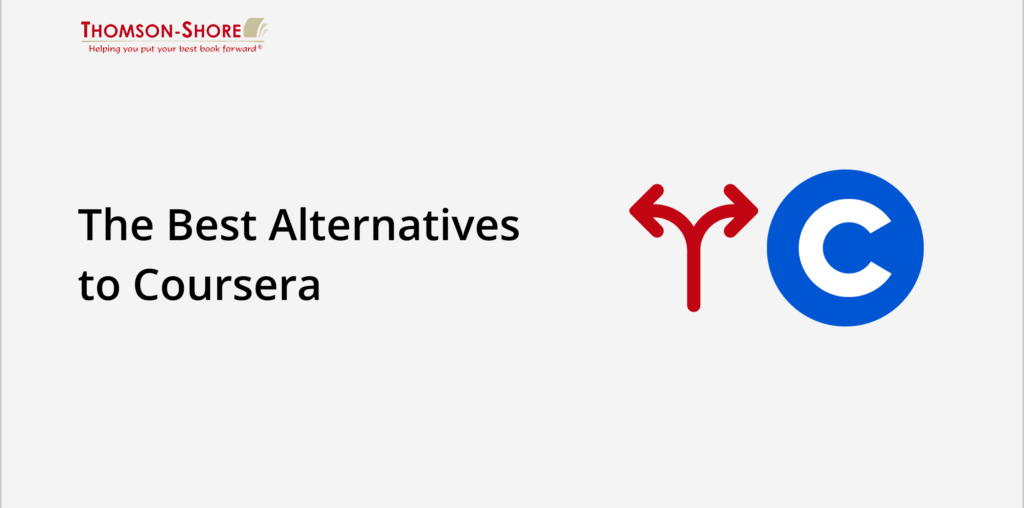As an avid online learner, I’ve spent countless hours on Coursera but always wondered if the grass might be greener elsewhere.
That’s why I explored Coursera’s competitors, taking at least one course on each platform. While Coursera offers excellent content, it’s not always the perfect fit for everyone’s learning style or goals.
This list of alternatives will help you find the platform that best suits your needs, more specialized courses and platforms, different pricing models, or unique learning experiences.
Top 10 Alternatives To Coursera: At A Glance (2024)
Here’s a quick comparison of the top Coursera alternatives I’ve tested:
| Platform | Main Focus | Course Format | Pricing Model | Certificate |
|---|---|---|---|---|
| Pluralsight | Tech and IT skills | Video-based, projects | Subscription-based | ✅ |
| edX | Academic and professional | MOOCs, university courses | Free / Paid upgrades | ✅ |
| Udemy | Wide variety of topics | Video courses | Per-course | ✅ |
| Udacity | Tech and programming | Nanodegree programs | Subscription-based | ✅ |
| Khan Academy | K-12, early college | Video lessons, practice | Free | ❌ |
| LinkedIn Learning | Professional development | Video courses | Subscription-based | ✅ |
| Skillshare | Creative skills | Project-based courses | Subscription-based | ❌ |
| Codecademy | Coding and web development | Interactive coding courses | Free / Pro subscription | ✅ |
| DataCamp | Data science and analytics | Interactive courses | Subscription-based | ✅ |
| FutureLearn | Academic and professional | MOOCs, university courses | Free / Paid upgrades | Yes |
Coursera Overview
But before we discuss the alternatives mentioned in the table above, I would like to give you a quick overview of Coursera.
Coursera is a recognized online learning platform that partners with top universities and organizations. It offers a wide array of courses, specializations, and even full-degree programs across various disciplines.
A few things that strike me as Pros and Cons about Coursera are:
Pros:
- High-quality courses from renowned institutions
- Flexible learning schedules
- Option for free audits on many courses
- Degree and certificate programs available
- Accredited Certificates
Cons:
- Some courses can be expensive
- Limited interaction with instructors
Why Consider An Alternative To Coursera
While Coursera is excellent, there are several reasons to explore alternatives:
- Specialized focus: Some platforms offer more in-depth courses in specific areas.
- Different learning formats: Interactive coding environments, project-based learning, etc.
- Some alternatives offer more flexible or affordable options.
- Platforms may offer tools or communities that better suit your needs.
- Alternatives might have courses not available on Coursera.
The Best Alternatives To Coursera Discussed In Detail
Here are all the details, my personal experience, and a comparison of each platform from the list in depth to help you decide which course is the best for you:
1. Pluralsight
| Pluralsight Free Trial | 10 days |
| Pluralsight Price | $29/month or $299/year |
| Pluralsight Course Type | Video courses, projects, interactive courses |
| Pluralsight is Best for? | Tech professionals, IT certification prep |
Pluralsight specializes in technology-related courses. It covers everything from software development and IT operations to cybersecurity and data science.
The platform also provides skill assessments to help you identify areas for improvement and personalize your learning path.
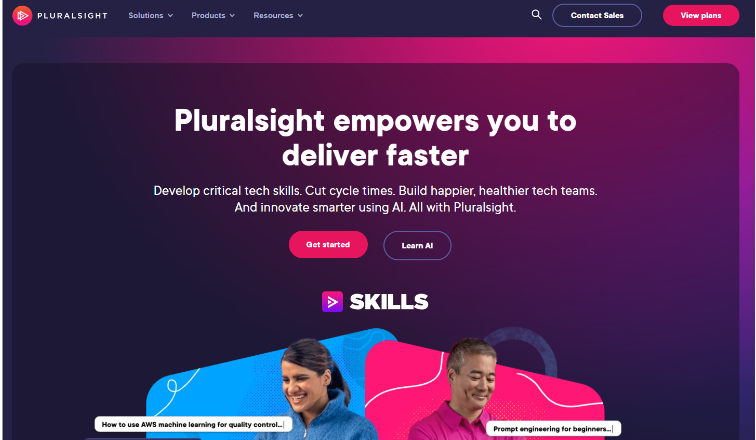
Compared to Coursera, Pluralsight focuses more on tech skills and offers more up-to-date content in rapidly evolving fields. However, it lacks the academic depth and variety of non-tech subjects that Coursera offers. You can also check out the official Pluralsight discount website to get coupons & promo codes that will help you save big on your purchase of its subscription.
2. edX
| Free Trial | Free courses available |
| Price | $50-$300 for verified tracks |
| Course Type | MOOCs, University courses, MicroMasters |
| edX is Best for? | Academic learners, professionals seeking credentials |
edX, founded by Harvard and MIT, offers various university-level courses from prestigious institutions worldwide.
The platform covers diverse subjects, from computer science to literature, and provides options for professional certificates and even complete master’s degrees.

The option to audit every course for free is a significant advantage, though you’ll need to pay for certificates and graded assignments. Unlike Coursera, edX offers MicroMasters programs, which can be applied towards on-campus degrees at some universities.
3. Udemy
| Free Trial | Free courses available |
| Price | Individual course pricing, often $10-$200 |
| Course Type | Video courses, practical skills |
| Udemy is Best for? | Hobbyists, professionals seeking specific skills |
Udemy stands out with its vast marketplace of courses created by individual instructors. It covers many topics, from professional skills to personal hobbies.
Compared to Coursera, Udemy offers more flexibility in course selection and pacing. The quality can vary significantly between courses, but the best ones are often very practical and up-to-date.

In my experience, Udemy is excellent for learning specific skills quickly, but it lacks the academic rigor and recognized certifications that Coursera offers.
4. Udacity
| Free Trial | Some free courses are available |
| Price | Nanodegree programs ~$399/month |
| Course Type | Nanodegree programs, tech-focused courses |
| Udacity is Best for? | Career-oriented tech professionals |
Udacity focuses on technology and business courses, offering “Nanodegree” programs in collaboration with industry giants like Google and Amazon.

In my experience, Udacity’s content is more industry-aligned than Coursera’s. The projects are often more complex and closely mimic real-world scenarios.
However, Udacity’s offerings are more limited in scope and generally more expensive than Coursera’s. It’s best suited for those looking to develop advanced tech skills for career progression.
5. Khan Academy
| Free Trial | Entirely free |
| Price | Free |
| Course Type | Video lessons, practice exercises |
| Khan Academy is Best for? | K-12 students, early college, test prep |
Khan Academy, a non-profit organization, offers free educational content primarily focused on K-12 subjects, early college courses, and test preparation.
Unlike Coursera, Khan Academy is completely free and targets a younger audience. It’s excellent for supplementing traditional education or brushing up on fundamentals.
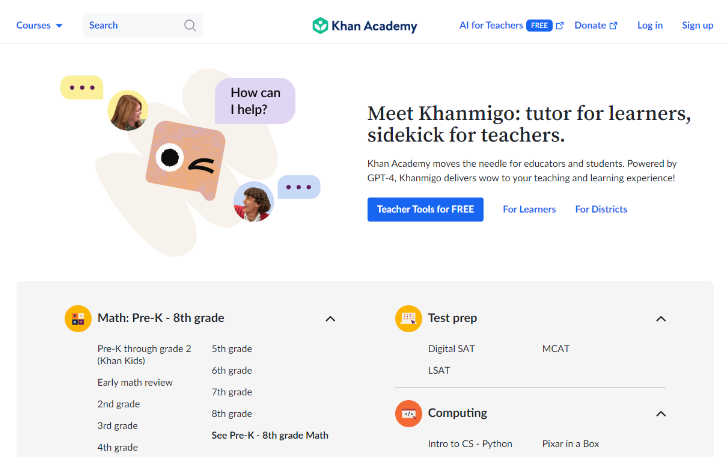
The lessons are concise and well-explained, but they lack the depth and variety of Coursera’s college-level courses. Thus, it’s an invaluable resource for students but less suitable for advanced professional development.
6. LinkedIn Learning
| Free Trial | 1 month |
| Price | $29.99/month or $239.88/year |
| Course Type | Video courses, professional development |
| LinkedIn Learning is Best for? | Professionals seeking career advancement |
LinkedIn Learning, formerly Lynda.com, offers professional development courses, from creative skills to business and technology.
Compared to Coursera, LinkedIn Learning’s courses are generally shorter and more focused on practical, job-related skills.

The integration with LinkedIn profiles is a unique advantage, allowing you to showcase completed courses to potential employers. However, it lacks the academic depth and degree options that Coursera offers.
7. Skillshare
| Free Trial | 1 month |
| Price | $29.99/month or $239.88/year |
| Course Type | Video courses, professional development |
| Skillshare is Best for? | Professionals seeking career advancement |
Skillshare specializes in creative and entrepreneurial skills, offering design, photography, writing, and business courses.
Unlike Coursera’s academic approach, Skillshare focuses on practical, project-based learning. From my experience, it’s excellent for developing creative skills and learning from industry professionals.

The courses are generally shorter and more informal than Coursera’s, making them ideal for quick skill acquisition but less suitable for in-depth academic study.
8. Codecademy
| Free Trial | 7 Day free trial |
| Price | $39.99/month or $239.88/year for Pro |
| Course Type | Interactive coding courses |
| Codecademy is Best for? | Aspiring programmers, tech enthusiasts |
Codecademy offers interactive coding courses covering various programming languages and web development skills.
Compared to Coursera, Codecademy provides a more hands-on, interactive learning experience specifically for coding.
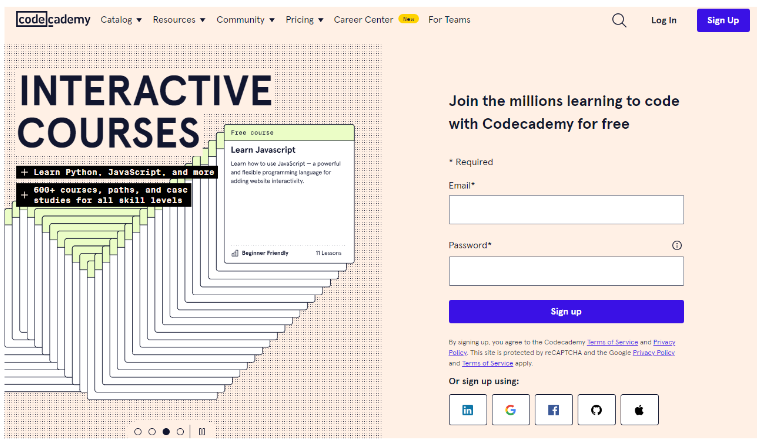
My favorite feature is the ability to write and test code directly in the browser, which is invaluable for beginners. However, it lacks the breadth of subjects and theoretical depth that Coursera offers.
9. DataCamp
| Free Trial | Free chapters |
| Price | $25/month billed annually |
| Course Type | Interactive data science courses |
| DataCamp is Best for? | Aspiring data scientists, analysts |
DataCamp specializes in courses from the field of data science and analytics courses, offering interactive learning experiences in R, Python, SQL, and more.
While Coursera offers data science courses, DataCamp provides a more focused and interactive experience in this field.
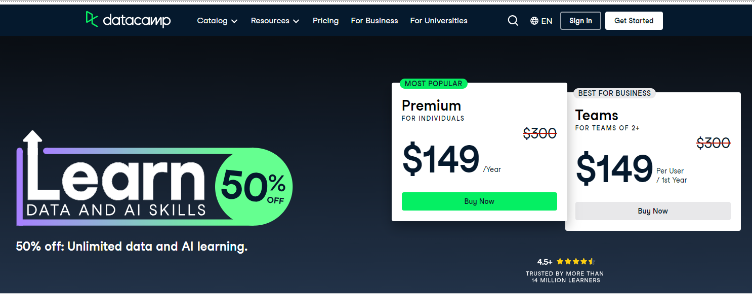
The bite-sized lessons and in-browser coding exercises make it easier to learn data skills quickly.
10. FutureLearn
| Free Trial | Free courses |
| Price | $279.99/year for unlimited courses |
| Course Type | MOOCs, university courses |
| DataCamp is Best for? | Lifelong learners, professionals |
FutureLearn partners with universities and institutions worldwide to offer a variety of courses across multiple disciplines. Similar to Coursera, FutureLearn offers academic-style courses from reputable institutions.
FutureLearn’s courses tend to have a more social learning approach, emphasizing discussion and peer interaction.
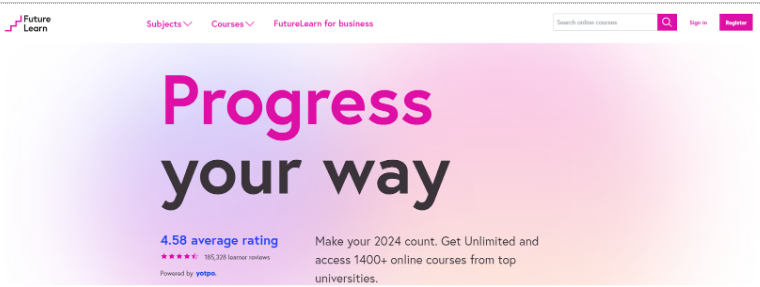
The platform offers a good balance of academic and professional courses but has a smaller selection than Coursera.
Conclusion: Pluralsight Is The Best Coursera Alternative!
The best Coursera alternative depends on your specific needs and goals. Your chosen platform should align with your learning style, career goals, and budget. However, if you are still unsure, go with my recommendations below.
Based on my testing of each platform, my top 3 picks for Coursera alternative are:
- For tech professionals: Pluralsight offers the most comprehensive and latest IT and software development content.
- For academic rigor: edX provides university-level courses that closely mimic traditional college experiences.
- For budget-conscious learners: Khan Academy provides high-quality, free education, especially for K-12 and early college subjects.
Combining these platforms can provide a well-rounded learning experience. For instance, you might use Coursera for structured programs and supplement with Pluralsight for tech skills.
Ultimately, the best platform is the one that motivates you to keep learning and helps you achieve your goals. Don’t be afraid to experiment with different options using their free trial and free courses to find your perfect fit today.
